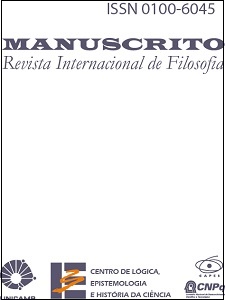Abstract
No meu artigo, argumento contra a seguinte tese de Cappelen e Lepore (2005): se o contextualismo fosse verdadeiro, a comunicação demandaria muitas coisas, e seria portanto frágil; a comunicação não é frágil, logo, ela não demanda muitas coisas e o contextualismo é falso. Devemos aceitar a robustez da comunicação, mas ela não é garantida por condições mínimas invariantes, e sim por diferentes mecanismos flexíveis que aumentam a chance da compreensão mútua a um custo relativamente baixo. Este é o caso de diferentes mecanismos de feedback e de diferentes modos de uma informação ser mutuamente disponível. A comunicação não é uma sucessão de ações individuais e independentes; diálogos são um tipo de atividade conjunta, e incompreensões são reparadas conjuntamente pelos participantes do diálogo como parte da atividade mesma na qual eles estão engajados. Além disto, se consideramos os diferentes papéis conversacionais de ouvintes, vemos que não há modo de tornar o argumento de Cappelen e Lepore ao mesmo tempo plausível e relevante. O ouvinte pode ou bem ser um participante confirmado da conversa ou não. No segundo caso, talvez incompreensões possam ocorrer facilmente, mas isto nada revela sobre o que ocorre num diálogo. Se o ouvinte for um participante do diálogo, muitas das condições da compreensão mútua são asseguradas pela atividade dialógica ela mesma, e os participantes do diálogo esforçam-se para que incompreensões não ocorram, como parte de suas responsabilidades como participantes do diálogo.
Abstract: In this paper, I argue against the thesis suggested by Cappelen and Lepore (2005), according to which if contextualism were true, communication would require many items, and therefore would be fragile; communication is not fragile, and therefore, communication does not demand a large number of conditions, and contextualism is false. While we should grant the robustness of communication, it is not guaranteed by some unchanging conditions, but by different flexible mechanisms that enhance the chances of mutual understanding at a relatively low cost – this is true, in particular, of different feedback mechanisms and of alternative ways to make the same information mutually available. Communication is not a series of successive, individual and independent actions; dialogues are a kind of joint activity in which misunderstandings are jointly repaired by participants as part of the very activity they are engaged in. Moreover, as we consider the roles of hearers in a conversation, we see that no construal makes Cappelen and Lepore’s argument both plausible and relevant. The hearer can either be overhearer or a certified participant. If the hearer is an overhearer, it may be the case that he easily misunderstands what is said, but it has no consequence to the understanding of what takes place in a dialogue, since, ex hypothesi, he is not a party to it. If the hearer is a participant, many of the conditions of mutual understanding will be assured in the dialogical activity itself, and both he and the speaker will make efforts to assure that mutual understanding do take place, as part of their responsibilities as parties to a dialogue – and their argument is not plausible.
Keywords: Communication. Contextualism. Robustness. Dialogues.
References
BEZUIDENHOUT, A. “Truth-conditional Pragmatics”. Philosophical Perspectives, 16, pp. 105-134, 2002.
BRENNAN, S. E., CLARK, H. H. “Conceptual Pacts and Lexical Choice in Conversation”. Journal of Experimental Psychology: Learning, Memory, and Cognition, 22, pp. 1482-1493, 1996.
CAPPELEN, H., LEPORE, E. Insensitive Semantics. Oxford: Blackwell, 2005.
CLARK, H. H. Using Language. Cambridge: Cambridge University Press, 1996.
CLARK, H. H., KRYCH, M. A. “Speaking while Monitoring Addressees for Understanding”. Journal of Memory and Language, 50, pp. 62-81, 2004.
CLARK, H. H., WILKES-GIBBS, D. “Referring as a Collaborative Process”. Cognition, 22, pp. 1-39, 1986.
CLARK, H. H., SCHAEFER, E. F. “Concealing one's meaning from overhearers”. Journal of Memory and Language, 26, pp. 209-225, 1987.
HANNA, J. E., TANENHAUS, M. “The Use of Perspective during Referential Interpretation”. In: John C. Trueswell and Michael K. Tanenhaus (eds.) (2005), pp. 133-152.
KEYSAR, B., BARR, D. J. “Coordination of Action and Belief in Communication”. In: John C. Trueswell and Michael K. Tanenhaus (eds.) (2005), pp. 71-94.
KITANO, H. “Biological Robustness”. Nature Reviews, 5, pp. 826-837, 2004.
SCHOBER, M. F., CLARK, H. H. “Understanding by addressees and overhearers”. Cognitive Psychology, 21, pp. 211-232, 1989.
TRUESWELL, J. C., TANENHAUS, M. K. (eds.). Approaches to Studying World-Situated Language Use. Cambridge, Mass.: The MIT Press, 2005.
WILLIAMSON, T. Knowledge and its Limits. Oxford University Press, 2000.

